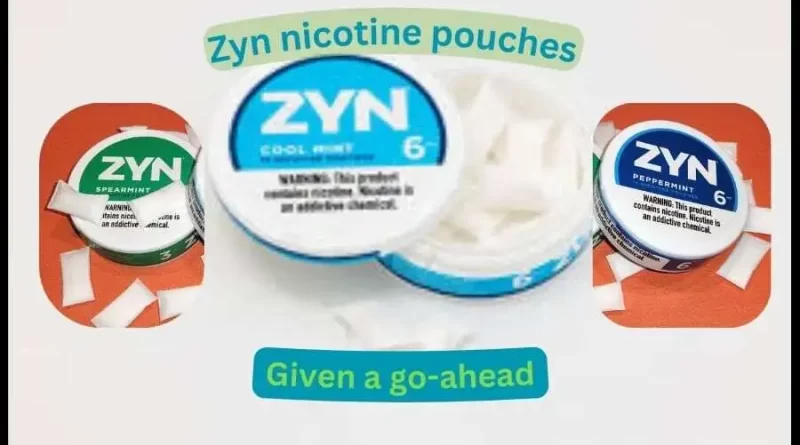FDA approves Zyn pouches amid safety concerns
Despite misgivings, the FDA gives a go-ahead to Zyn nicotine pouches for smokers
The harmful effects of nicotine pouches are a given and various groups opposing it, allege that in the long run, the effects are similar to cigarette consumption. However, the FDA believes otherwise with the organization’s approval of Zyn nicotine pouches. FDA claims that Philip Morris International’s Zyn is there to help adults reduce cigarette cravings or do with it altogether, citing its health benefits.
FDA approved the product coming in various flavors like menthol, mint and coffee. Nowadays, the nicotine pouch is fast gaining a market niche amongst other various tobacco products. For the first time, approval has been granted for these products. FDA often puts forth the facts regarding a decrease in the smoking patterns amongst adults with the latter shifting to Zyn products.
Pouch consumption amounts to addiction as per some groups
Nevertheless, various tobacco-control groups allege that addiction to the pouches ultimately leads them to consume cigarettes or nicotine-containing products. Many others, who support these products, say that lower nicotine levels have been reported in Zyn pouches, with its slow release in the gums. Similar to older smoking-stopping products, Zyn works just like nicotine gum and lozenges, reducing craving.
According to NLM (National Library of Medicine), National Center for Biotechnology Information, the pouches are addictive in the long run. The side-effects include gum irritation, hiccups or nausea according to the nicotine pouches consumers. But more than that, the dangerous side effects as per the NLM statement, of the product come with higher risks of cardiovascular diseases, stroke, and reproductive harm in the eventuality of its long-term use.
Nicotine isn’t cancer-causing, is considered a vasoconstrictor, and harms moderately initially, but damages the above systems immensely in the long run. Its long-term health effects are unknown, with it being addictive in nature and since the earlier frivolous use of the pouches was hitherto absent, not much is known about its actual side effects.
As per the FDA, these Zyn pouches are less harmful
FDA claims that the Zyn pouches contain less harmful ingredients than cigarettes and different types of chewing tobacco. Products like snuff, highly linked to cancer and other life-threatening diseases are claimed to be more harmful than the pouches, according to the agency. To further strengthen the FDA’s claims, its officials say that the pouches have been available for ten years and there are statistics to prove them as less harmful than other traditional products.
For FDA approval, the companies are required to prove the reducing effects of tobacco-induced diseases. That also includes discouraging its use among teenagers and adolescents. Zyn, according to the FDA, is just less harmful than traditional tobacco products rather than being totally safe.
Matthew Farrelly of FDA’s Center for Tobacco Products says, “In this case, the data show that these nicotine pouch products meet that bar by benefiting adults who use cigarettes or smokeless tobacco products.” Notably, the FDA earlier approved many e-cigarette brands, a tobacco-heating device, and snus, a type of pasteurized tobacco that is popular in Scandinavian countries. The only difference between snus and Zyn including other products in the market is the absence of tobacco, containing only nicotine and flavoring.
Many of the marketing strategies of Zyn have been under fire and in 2021 it was criticized for its advertising sloganeering in places where smoking is banned. The slogan, “Can’t smoke? Can’t vape? Can Zyn,” was aimed at extracting a customer base for the company, while presenting nicotine pouches as a better alternative to regular smoking. Marketed in the US by Swedish Match, a unit of Philip Morris, it is in a competition with other tobacco products, especially from Altria’s On pouches.
And 2024 was marked by yet another bout of criticism by The Guardian author Alaina Demopoulos, about the prizes and incentives offered by the company in lieu of purchasing these products. The purchases, according to her, in an article titled, “Use nicotine, win an iPad!”, also awarded points as if to necessitate the nicotine use amongst the users.
From what appears in various media reports, companies have adopted many unethical marketing practices aimed at luring even non-smokers. Also, the young population is targeted to enhance the downswing sales graph. The aggressiveness can be gauged from the fact that advertising is used on a mass scale to lure the persons further and regulatory policies are the need of the hour. Apart from that, filling up the research gaps on a timely basis to make the policies information-based, will certainly add up to the corrective measures.
After a fall was reported in the number of underage tobacco users in the US, companies tried desperate measures to lure back the consumers once again. The dwindling sales prompted them to develop alternative products but they faced severe criticism due to an increased usage of these products in a single year. These included E-cigarettes, made popular some ten years ago.
Despite the FDA continuously being in favor of these products by citing government survey data, antismoking groups and certain research-based organizations, like NLM, often point towards the damaging effects of the addictive pouches. The FDA has put forth the government survey data showing that less than 2 percent of American high school and middle school students used these Zyn pouches last year.
In a chain effect of sorts, videos of youngsters consuming Zyn are doing rounds with millions of views coming on them. One can easily understand the kind of havoc wreaked on the adolescents who are among the vulnerable lot. It also means that weaning them away from the traditional tobacco products leads them to find other alternatives to satisfy their nicotine cravings which these pouches offer, as per many anti-smoking groups. The quantity too matters with the companies possibly increasing that as well and Russia and Eastern European countries, are apt instances in this case. In 2018, companies in both regions were selling pouches with a much higher content (>20 mg/pouch), exceeding the limit needed to cut down the tobacco cravings. The NP category has now been banned in Russia








